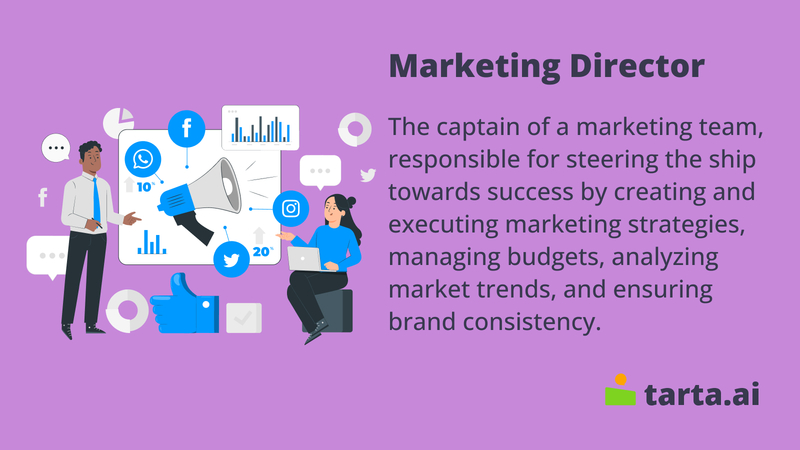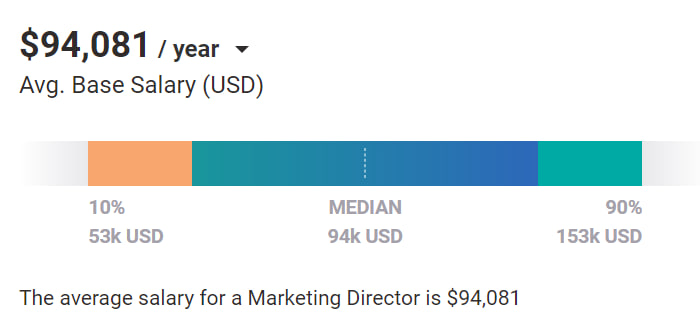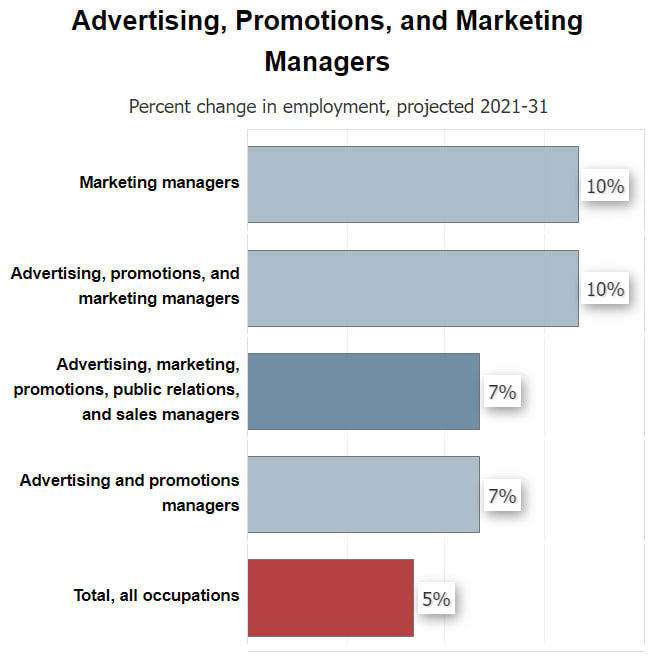Mastering the Art of Marketing: A Complete Guide for Aspiring Marketing Directors

Marketing is a critical component of any business, and a Marketing Director plays a crucial role in overseeing all aspects of an organization's marketing efforts to achieve its goals and objectives. A Marketing Director is responsible for developing and implementing marketing strategies, managing budgets, leading and managing the marketing team, analyzing market trends, ensuring brand consistency, and staying up-to-date with industry developments.
In this article, we will explore the role of a Marketing Director in more detail, including their responsibilities, required skills, and salary. We will also discuss how to become a Marketing Director, alternative career options in marketing, and the projected job growth in the field. Whether you are considering a career as a Marketing Director or simply interested in learning more about this field, this article provides valuable insights into the world of marketing.
Position Overview
A Marketing Director is a senior executive responsible for overseeing the marketing activities of an organization. They are responsible for developing and implementing marketing strategies to promote the organization's products or services and enhance its brand image. The Marketing Director typically manages a team of marketing professionals and works closely with other departments such as sales, product development, and customer service to ensure that all marketing efforts are aligned with the organization's goals and objectives. The role of a Marketing Director requires strong leadership, strategic thinking, and excellent communication skills. They must also have a deep understanding of the market and be able to identify and capitalize on new opportunities for growth.

Key Qualifications
To become a Marketing Director, there are typically several requirements and qualifications that an individual should have, including:
- Education: Most Marketing Director positions require a bachelor's degree in marketing, business administration, or a related field. Some organizations may prefer candidates with a master's degree in marketing or a related field.
- Work experience: Employers generally prefer Marketing Directors to have significant experience in marketing, advertising, and/or sales. A typical requirement is 5-10 years of experience in a marketing-related role, including experience in managing marketing teams and budgets.
- Leadership skills: As a Marketing Director, you will be responsible for leading a team of marketing professionals, so it's essential to have strong leadership skills, including the ability to motivate and inspire your team, delegate tasks effectively, and provide constructive feedback.
- Strategic thinking: A Marketing Director must be able to develop and implement effective marketing strategies that align with the organization's overall goals and objectives. This requires strategic thinking, creativity, and the ability to analyze market trends and customer behavior.
- Communication skills: Marketing Directors need excellent communication skills, both written and verbal, to effectively communicate with internal stakeholders, external partners, and customers.
- Technical skills: In today's digital age, Marketing Directors must be familiar with various marketing technologies and tools such as digital marketing, social media, and data analytics.
- Industry knowledge: To be successful in a Marketing Director role, it's essential to have a deep understanding of the industry and market you are operating in, including knowledge of your competitors, trends, and regulations.
Tasks and Expectations
The main responsibilities of a Marketing Director can vary depending on the organization, but typically include:
- Developing and implementing marketing strategies: Identifying target markets, creating messaging and positioning, and developing campaigns that drive brand awareness, engagement, and sales.
- Managing marketing budgets: Monitoring expenses, negotiating contracts with vendors and agencies, and ensuring that campaigns are delivered on time and on budget.
- Leading and managing the marketing team: Setting team goals, conducting performance reviews, and developing talent within the team.
- Analyzing market trends and customer behavior: Analyzing market research, monitoring industry trends, and using data analytics to track and measure campaign performance.
- Collaborating with other departments: Collaborating on campaigns, product launches, and events.
- Ensuring brand consistency: Developing brand guidelines, monitoring brand usage, and ensuring that all marketing materials meet brand standards.
- Staying up-to-date with industry developments: Attending industry events, reading industry publications, and networking with peers in the industry.
In addition to the main responsibilities of a Marketing Director, there are several additional duties that they may be required to perform, depending on the organization's needs. These can include:
- Developing and managing partnerships: Developing partnerships with other organizations or businesses to promote the organization's products or services.
- Managing public relations: Managing the organization's public relations efforts, including developing press releases, managing media inquiries, and developing relationships with journalists and media outlets.
- Developing and managing sponsorships: Developing and managing sponsorship agreements with other organizations or events to increase brand awareness and promote the organization's products or services.
- Managing events: Managing events, such as product launches, trade shows, and conferences, to promote the organization's products or services and increase brand awareness.
- Developing and managing digital marketing strategies: Developing and managing digital marketing strategies, including social media, email marketing, and online advertising, to reach target audiences and increase engagement.
- Conducting market research: Conducting market research to identify customer needs, preferences, and trends to develop effective marketing strategies.
- Managing brand reputation: Managing the organization's brand reputation, including responding to customer complaints and managing online reviews and ratings.
Overall, a Marketing Director is responsible for overseeing all aspects of the organization's marketing efforts and ensuring that they are aligned with the organization's goals and objectives. The specific duties and responsibilities may vary depending on the organization's size, industry, and marketing objectives.

Photo: Campaign Creators/Unsplash
Hard and Soft Skills
To be successful as a Marketing Director, there are both hard and soft skills that are necessary.
Hard skills | Soft skills |
Data analytics The ability to analyze data and use it to inform marketing strategies and campaigns is essential for a Marketing Director. This includes the ability to use analytics tools to track and measure campaign performance, identify trends, and make data-driven decisions. | Leadership A Marketing Director must be able to lead and manage a team of marketing professionals, providing guidance, motivation, and feedback. |
Digital marketing A Marketing Director must have knowledge of various digital marketing techniques, such as social media marketing, search engine optimization (SEO), pay-per-click (PPC) advertising, and email marketing. | Communication A Marketing Director must be able to communicate effectively with internal stakeholders, external partners, and customers. This includes both written and verbal communication skills. |
Budget management A Marketing Director must have experience managing marketing budgets and making sure that resources are allocated effectively. | Strategic thinking A Marketing Director must be able to think strategically and develop effective marketing strategies that align with the organization's goals and objectives. |
Project management A Marketing Director must be able to manage multiple projects simultaneously, prioritize tasks, and ensure that projects are delivered on time and on budget. | Creativity A Marketing Director must be able to think creatively and come up with innovative marketing ideas that differentiate the organization from its competitors |
Brand management A Marketing Director must have experience developing and managing a brand, including creating brand guidelines, managing brand usage, and ensuring that all marketing materials meet brand standards. | Collaboration A Marketing Director must be able to collaborate effectively with other departments, such as sales, product development, and customer service, to ensure that marketing efforts are aligned with overall business goals. |
A successful Marketing Director must have a combination of hard and soft skills to develop and execute effective marketing strategies and campaigns, manage budgets and resources, and lead and manage a team of marketing professionals.
Compensation
According to data from PayScale, the average salary for a Marketing Director in the United States is around $94,000 per year.

Source: PayScale
The average salary for a Marketing Director can vary significantly from state to state in the United States. Here are the average annual salaries for Marketing Directors in some of the most populous states:
- California: $142,000
- New York: $129,000
- Texas: $107,000
- Florida: $99,000
- Illinois: $107,000
- Pennsylvania: $98,000
- Ohio: $96,000
- Georgia: $108,000
- North Carolina: $103,000
- Michigan: $101,000
It's important to note that these are just averages, and salaries can vary based on a number of factors, including experience, industry, and company size.
Strategies for Increasing Income
There are several ways to improve your earnings as a Marketing Director or in any profession. Here are a few suggestions:
- Increase your knowledge and skills: Continuously learning and improving your skills is a great way to stay competitive in the job market and increase your value to employers. Attend industry conferences, take courses or workshops, and stay up to date with the latest marketing trends and technologies.
- Consider additional certifications: There are many certifications available for marketing professionals, such as the Digital Marketing Institute's Certified Digital Marketing Professional. This can help you stand out and demonstrate your expertise to potential employers.
- Negotiate your salary: If you are already employed as a Marketing Director, consider negotiating your salary when you are up for a performance review or at the end of a successful project. Do your research and present data to support your request for a higher salary.
- Look for new opportunities: Keep an eye out for new job openings that may offer higher salaries or better benefits. Be open to exploring opportunities in different industries or locations.
- Start a side business: Consider starting a side business or consulting on the side to generate additional income. This can also help you build your network and reputation within your industry.
Remember, improving your earnings is not just about increasing your salary, but also about making smart financial decisions, investing wisely, and creating multiple streams of income.
Interesting fact:
A survey by the American Marketing Association (AMA) found that the top skills required for a successful career in marketing include strategic thinking, creativity, data analysis, communication, and project management.
Supplementary Perks
In addition to salary, there are several additional benefits that Marketing Directors may be able to negotiate or receive from their employers. These benefits can help improve overall compensation and work-life balance. Here are some common additional benefits for Marketing Directors:
Benefit | Description |
Bonus | Marketing Directors may be eligible for bonuses based on company performance or individual performance. This can be a significant boost to earnings and can provide motivation to achieve targets. |
Health insurance | Employers may offer health insurance benefits that cover medical, dental, and vision expenses. This can help reduce out-of-pocket costs for healthcare. |
Retirement benefits | Employers may offer retirement benefits such as 401(k) plans, pension plans, or profit-sharing plans. These can help save for retirement and potentially provide additional income in the future. |
Flexible work arrangements | Marketing Directors may be able to negotiate flexible work arrangements such as remote work or flexible schedules. This can improve work-life balance and reduce commuting costs. |
Paid time off | Employers may offer paid time off for holidays, vacations, and sick leave. This can help reduce stress and allow for rest and relaxation. |
Professional development | Employers may offer professional development benefits such as tuition reimbursement, training programs, or mentorship opportunities. This can help improve skills and advance career goals. |
Stock options | Marketing Directors may be eligible for stock options or equity compensation. This can provide additional income if the company performs well in the stock market. |
These benefits can vary by employer and may not be available in every organization. It's important to research and negotiate benefits as part of overall compensation.
Work Environment
In this section, we will be discussing various aspects of marketing, including marketing strategy, tactics, and tools that are commonly used by Marketing Directors. Marketing is a vital component of any business, and its effectiveness can determine the success or failure of a company. As a Marketing Director, it is essential to understand the various marketing methods and tools available to create and execute successful marketing campaigns. We will explore various topics related to marketing, including branding, customer relationship management, social media marketing, content marketing, and email marketing.

Photo: Scott Graham/Unsplash
As a Marketing Director, there are several job environment settings that can benefit your role and contribute to your success. Here are a few examples:
- Collaborative culture: A work environment that encourages collaboration and teamwork can be very beneficial for a Marketing Director. Working alongside other professionals in different departments like sales, product development, and customer service, can help you gain insight into customer behavior and preferences, ultimately resulting in a more effective marketing strategy.
- Access to resources: Having access to the right resources, such as market research tools, data analytics, and other technologies, can help you gather relevant data to make informed decisions about marketing strategies. It can also help you analyze customer data to identify trends and opportunities.
- Flexibility: A flexible work environment can allow you to balance your work and personal life, which can help you maintain productivity and creativity. This can include working from home, flexible schedules, and other benefits that promote work-life balance.
- Innovation-focused culture: An innovation-focused culture encourages employees to think outside the box and come up with creative marketing strategies. A culture that supports experimentation, risk-taking, and new ideas can help you stay ahead of the competition.
- Employee development: A company that invests in employee development, whether through training or mentorship, can help you build your skills and expertise as a Marketing Director. This can lead to personal growth and career advancement opportunities.
Marketing Directors use a wide range of tools and technologies to execute effective marketing strategies and achieve their goals. Here are some examples:
- Customer relationship management (CRM) software: CRM software is used to manage customer interactions and track customer data, including purchase history, behavior, and preferences. This information can be used to create targeted marketing campaigns and personalized communications.
- Social media management tools: Social media management tools are used to schedule and publish content on social media platforms like Facebook, Twitter, and LinkedIn. These tools also help monitor social media activity, track engagement metrics, and identify opportunities for growth.
- Marketing automation software: Marketing automation software helps automate repetitive marketing tasks such as email campaigns, lead nurturing, and social media scheduling. This saves time and allows Marketing Directors to focus on higher-level strategy.
- Web analytics tools: Web analytics tools help track website traffic and measure the effectiveness of marketing campaigns. This data can be used to optimize website design, content, and user experience.
- Content management systems (CMS): CMS platforms are used to create and manage website content, including blog posts, landing pages, and other marketing materials.
- Email marketing software: Email marketing software is used to create and manage email campaigns, track email metrics, and manage email lists.
- Video editing software: Video editing software is used to create and edit video content for marketing campaigns, including product demos, promotional videos, and social media content.
- Project management tools: Project management tools are used to manage marketing projects, including task assignments, timelines, and collaboration among team members.
- Data analytics tools: Data analytics tools help analyze large amounts of data and identify trends and insights that can inform marketing strategy.
Marketing is a critical aspect of any business, and it requires careful planning, execution, and management to achieve success. As a Marketing Director, it is essential to have a deep understanding of marketing strategies, tactics, and tools available to create effective marketing campaigns that can help achieve business goals. By leveraging various marketing tools and technologies, Marketing Directors can create targeted marketing campaigns, analyze customer data, and measure the effectiveness of marketing efforts. With the right approach and a strong understanding of marketing, Marketing Directors can drive business growth and success.
Education and Training
Becoming a Marketing Director typically requires a combination of education, experience, and skills. Here are some of the key steps you can take to become a Marketing Director:
- Obtain a Bachelor's Degree: A bachelor's degree in marketing, business administration, or a related field is typically required to become a Marketing Director. Some common courses include market research, advertising, consumer behavior, and brand management.
- Gain Marketing Experience: You can gain marketing experience through internships, entry-level positions, or freelance work. Starting out in a marketing or advertising agency is a common path, as you'll be able to work with a variety of clients and learn different marketing techniques.
- Develop Strong Communication and Analytical Skills: Effective communication is essential for a Marketing Director, as they need to be able to clearly communicate marketing strategies to various stakeholders, including clients, executives, and team members. Additionally, a strong analytical ability is necessary to interpret data, identify trends, and make informed decisions.
- Pursue Advanced Education: Many Marketing Directors have a Master's degree in marketing, business administration, or a related field. This can help you stand out in a competitive job market and provide you with additional knowledge and skills.
- Build a Professional Network: Networking can help you learn about job openings, gain new clients, and learn from other marketing professionals. Attend industry events, join professional organizations, and connect with colleagues and mentors to build a strong network.
- Gain Leadership Experience: As a Marketing Director, you'll need to lead and manage a team of marketing professionals. Seek out opportunities to gain leadership experience, such as serving as a team leader, managing a project, or volunteering in a leadership role.
Interesting fact:
A study by the Marketing Institute found that the most common educational background for Marketing Directors is a Bachelor's degree in marketing, followed by a Master's degree in business administration (MBA).
Becoming a Marketing Director requires a combination of education, experience, and skills. By pursuing a degree in marketing or a related field, gaining marketing experience, developing strong communication and analytical skills, pursuing advanced education, building a professional network, and gaining leadership experience, you can increase your chances of success in this field.
Advancement Opportunities
In today's dynamic business environment, marketing plays a critical role in helping organizations achieve their goals. As companies seek to expand their reach and differentiate themselves from competitors, the role of the Marketing Director has become increasingly important. However, the field of marketing is diverse and there are many subfields and alternative career options to consider. In this section, we will explore different subfields within the field of marketing direction, as well as alternative career options for those interested in pursuing a career related to marketing but with a different focus or skill set.

Steps to Develop a Marketing Director Career
Here are some steps you can take to develop a career as a Marketing Director:
- Get experience in marketing: Build your marketing skills and knowledge by working in marketing roles, such as a marketing coordinator or specialist, product manager, or brand manager.
- Develop leadership skills: Develop skills in management, leadership, and strategic planning. This can be done through taking courses or workshops, or by seeking out leadership opportunities in your current role.
- Network: Attend industry events, join marketing associations, and connect with other professionals in the field to expand your knowledge and gain valuable contacts.
- Stay current with industry trends: Keep up with the latest marketing trends and technologies, and be able to apply them to your work. Attend conferences, read industry publications, and stay active on social media.
- Build a portfolio: Build a portfolio of successful marketing campaigns or projects to showcase your skills and accomplishments.
- Pursue higher-level roles: Seek out opportunities for advancement, such as a marketing manager or director role. Be proactive in seeking out these opportunities and demonstrate your leadership skills and marketing expertise.
Remember, developing a Marketing Director Career takes time and dedication. It's important to be patient and continue to learn and grow as a marketer.
Specializations in Marketing Leadership
Here are some subfields within the field of marketing direction:
Subfield | Description |
Product Marketing | This subfield involves developing and executing marketing strategies for specific products or product lines. Product marketers are responsible for conducting market research, developing product positioning and messaging, and creating marketing campaigns to drive product awareness and adoption. |
Brand Marketing | Brand marketing focuses on building and managing the overall brand image and reputation. Brand marketers develop and execute branding strategies, manage brand identity and messaging, and create campaigns to promote brand awareness. |
Digital Marketing | This subfield involves using digital channels to reach and engage with consumers. Digital marketers use techniques such as search engine optimization (SEO), social media marketing, email marketing, and paid advertising to drive traffic and generate leads. |
Advertising | Advertising involves creating and executing advertising campaigns across various channels, such as television, radio, print, and digital media. Advertising professionals work with creative teams to develop ad concepts and messaging, and use data and analytics to optimize campaigns for maximum impact. |
Market Research | This subfield involves conducting market research to understand consumer behavior, preferences, and trends. Market researchers use techniques such as surveys, focus groups, and data analysis to gather insights that inform marketing strategies and decision-making. |
Sales Enablement | This subfield involves providing sales teams with the tools and resources they need to be successful. Sales enablement professionals create sales collateral, such as presentations and case studies, and develop training programs to help sales teams understand product messaging and value propositions. |
Public Relations | Public relations professionals focus on managing an organization's public image and reputation. They work to develop positive relationships with the media and other key stakeholders, and create campaigns to promote the organization's brand and message. |

Photo: path digital/Unsplash
Other Career Possibilities
If you are interested in pursuing a career that is related to marketing but may offer a different focus or skill set, here are some alternative career options to consider:
- Market Research Analyst: In this role, you would be responsible for conducting research to understand consumer behavior, preferences, and trends. You would use a variety of research methods and tools to gather data and insights that inform marketing and business decisions.
- Public Relations Specialist: Public relations specialists manage an organization's public image and reputation. They work to create and maintain positive relationships with the media and other stakeholders, and develop strategies and campaigns to promote the organization's brand and message.
- Sales Manager: Sales managers oversee a team of sales professionals and are responsible for setting sales goals and developing strategies to achieve them. They work closely with marketing teams to develop sales collateral and messaging, and may also be involved in product development and pricing strategies.
- Advertising Sales Agent: Advertising sales agents sell advertising space to businesses and organizations. They work to identify potential clients, develop sales strategies, and negotiate contracts.
- E-commerce Manager: E-commerce managers oversee an organization's online sales and marketing efforts. They are responsible for developing and executing e-commerce strategies, managing online storefronts, and optimizing the user experience to drive sales.
- Customer Relationship Manager: In this role, you would be responsible for managing relationships with customers and developing strategies to enhance customer satisfaction and loyalty. You would work closely with marketing teams to develop customer-focused campaigns and messaging.
- Content Marketing Manager: Content marketing managers are responsible for developing and executing content strategies that engage and inform audiences. They work to create high-quality content, such as blog posts, videos, and social media content, that drives traffic and generates leads.
The field of marketing offers a wide range of career options, with many subfields and alternative paths to explore. Whether you are interested in product marketing, brand marketing, digital marketing, market research, sales enablement, public relations, or any other area related to marketing, there are opportunities to grow and advance your career. Additionally, if you are interested in pursuing a career related to marketing but with a different focus or skill set, there are many alternative career options to consider. The key to success in the field of marketing is to stay current with industry trends, develop leadership skills, and build a strong foundation in marketing principles and techniques. With dedication and hard work, you can build a rewarding and fulfilling career in marketing.
Employment Trends
Marketing Director Demand
Marketing Directors are responsible for overseeing a company's marketing strategies, including branding, advertising, and promotional activities. The demand for Marketing Directors in the US is influenced by various factors, including the state of the economy, industry trends, and the size and type of the company.
According to the Bureau of Labor Statistics (BLS), employment of advertising, promotions, and marketing managers (which includes Marketing Directors) is projected to grow 10 percent from 2021 to 2031, faster than the average for all occupations. This growth is attributed to the continued importance of advertising and promotions in the success of businesses and the increasing use of digital and social media marketing.

Source: U.S. Bureau of Labor Statistics, Employment Projections program
Additionally, the demand for Marketing Directors varies by industry. For example, Marketing Directors in the healthcare industry are projected to have faster than average job growth due to an aging population and increasing healthcare needs. On the other hand, Marketing Directors in the print publishing industry may experience slower job growth due to the declining popularity of print media.
Overall, the demand for Marketing Directors in the US is expected to continue growing, particularly in industries that rely heavily on marketing and advertising to reach customers.
Flexible and Remote Work Arrangements
Here are some options for part-time and remote jobs for Marketing Directors based on trends in the job market:
- Freelance marketing consulting: As a Marketing Director, you can offer your expertise as a consultant to businesses looking to improve their marketing strategies. This can be done on a part-time basis, and you can work remotely from anywhere.
- Remote Marketing Director roles: Many companies now offer remote work options for Marketing Directors. You can search for these roles on job search websites or reach out to companies that you're interested in working for and inquire about remote opportunities.
- Part-time Marketing Director roles: Some companies may be willing to hire a Marketing Director on a part-time basis, especially if they don't need a full-time employee or are looking to cut costs. You can search for these roles on job search websites or reach out to companies directly.
- Social media management: Many businesses need help managing their social media presence, and as a Marketing Director, you can offer your services on a part-time or freelance basis. This can be done remotely, and you can work with multiple clients at once.
- Content marketing: Content marketing is a growing field, and many businesses are in need of experienced Marketing Directors to help them create and implement effective content marketing strategies. You can offer your services as a freelancer or part-time employee and work remotely.
There are many part-time and remote job options for Marketing Directors. It's important to search for opportunities that align with your skills and interests and to be open to different types of work arrangements.
Interesting fact:
A survey by LinkedIn found that the most common industries for Marketing Directors are technology, retail, consumer goods, finance, and healthcare.
Job Fulfillment
This section discusses the pros and cons of a Marketing Director's job. Marketing Directors play a crucial role in driving the success of a company's marketing initiatives, and their responsibilities typically include developing marketing campaigns, managing budgets, and overseeing a team of marketing professionals. While there are many benefits to being a Marketing Director, including high earning potential, creative freedom, and opportunities for growth, there are also several challenges, such as long hours, high stress, and uncertainty of success. In this section, we will explore these pros and cons in more detail, to provide a comprehensive understanding of what it is like to work as a Marketing Director.

Photo: Priscilla Du Preez/Unsplash
Pros of a Marketing Director's Job | Cons of a Marketing Director's Job |
Creative freedom As a Marketing Director, you get the opportunity to use your creativity to develop marketing campaigns, strategies and tactics that will make the brand stand out. | Long hours The job of a Marketing Director can be demanding, with long hours and tight deadlines. |
High earning potential Marketing Directors are generally well-paid due to their experience and expertise. | High stress The pressure to deliver results can be high, which can lead to stress and burnout. |
High level of responsibility Marketing Directors are typically responsible for managing a team, overseeing budgets, and driving the success of a company's marketing initiatives. | Challenging to keep up with changing trends Marketing is a constantly evolving field, which requires Marketing Directors to stay up-to-date with new trends and technologies. |
Opportunity for growth With experience, Marketing Directors can move up the corporate ladder to become Vice Presidents or Chief Marketing Officers. | Uncertainty of success Even with careful planning, there is no guarantee that a marketing campaign will be successful, which can be frustrating. |
Diverse work Marketing Directors work across a range of channels, including digital marketing, social media, and traditional advertising, which provides a diverse and exciting work experience. | High level of competition There are many Marketing Directors vying for the top positions at leading companies, which can make it difficult to advance in the field. |
The role of a Marketing Director is both challenging and rewarding. While Marketing Directors enjoy creative freedom, high earning potential, and opportunities for growth, they also face long hours, high stress, and the uncertainty of success in a constantly evolving field. Despite these challenges, the job of a Marketing Director can be fulfilling for those who have a passion for marketing and are willing to work hard to achieve success. Ultimately, the decision to pursue a career as a Marketing Director depends on individual preferences and goals, but with careful consideration and dedication, it can be a fulfilling and rewarding profession.
The role of a Marketing Director is a critical one that requires a combination of hard and soft skills, including data analytics, digital marketing, budget management, project management, leadership, communication, strategic thinking, creativity, and collaboration. While the job offers high earning potential and creative freedom, it also involves long hours, high stress, and high competition. To be successful in this field, it is essential to stay current with industry trends, develop strong leadership and marketing skills, and build a professional network. Whether you are considering a career as a Marketing Director or exploring alternative career options in marketing, it is important to understand the demands and rewards of this field. With the projected job growth in the industry, there are many exciting opportunities available for those with a passion for marketing and a willingness to work hard to achieve success.
- A Marketing Director oversees all aspects of an organization's marketing efforts to achieve its goals and objectives.
- Required skills for a successful Marketing Director include data analytics, digital marketing, budget management, project management, leadership, communication, strategic thinking, creativity, and collaboration.
- Becoming a Marketing Director typically involves obtaining a Bachelor's degree in marketing or a related field, gaining marketing experience, developing strong communication and analytical skills, pursuing advanced education such as a Master's degree, building a professional network, and gaining leadership experience.
- Alternative career options in marketing include market research analyst, public relations specialist, sales manager, advertising sales agent, e-commerce manager, customer relationship manager, and content marketing manager.
- The demand for Marketing Directors in the US is projected to grow 10% from 2021 to 2031, with faster growth expected in industries that rely heavily on marketing and advertising to reach customers.
- While the job of a Marketing Director offers high earning potential and creative freedom, it also involves long hours, high stress, and high competition.
FAQ
What does a Marketing Director do?
A Marketing Director is responsible for overseeing all aspects of an organization's marketing efforts to achieve its goals and objectives. This includes developing and implementing marketing strategies, managing marketing budgets, leading and managing the marketing team, analyzing market trends and customer behavior, collaborating with other departments, ensuring brand consistency, and staying up-to-date with industry developments.
How much does a Marketing Director make?
The average salary for a Marketing Director in the United States is around $94,000 per year. However, this can vary depending on factors such as location, company size, industry, and years of experience.
What qualifications do you need to become a Marketing Director?
Becoming a marketing director typically involves obtaining a Bachelor's degree in marketing or a related field, gaining marketing experience, developing strong communication and analytical skills, pursuing advanced education such as a Master's degree, building a professional network, and gaining leadership experience.
What are the key skills needed to be a successful Marketing Director?
Successful Marketing Directors possess a combination of hard and soft skills, including data analytics, digital marketing, budget management, project management, leadership, communication, strategic thinking, creativity, and collaboration.
What are some of the challenges of being a Marketing Director?
The Marketing Director's job can involve long hours, high stress, the challenge of keeping up with changing trends, uncertainty of success, and high levels of competition. However, the role also offers creative freedom, high earning potential, high levels of responsibility, opportunities for growth, and diverse work.